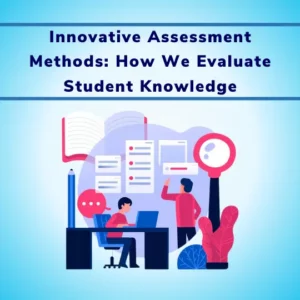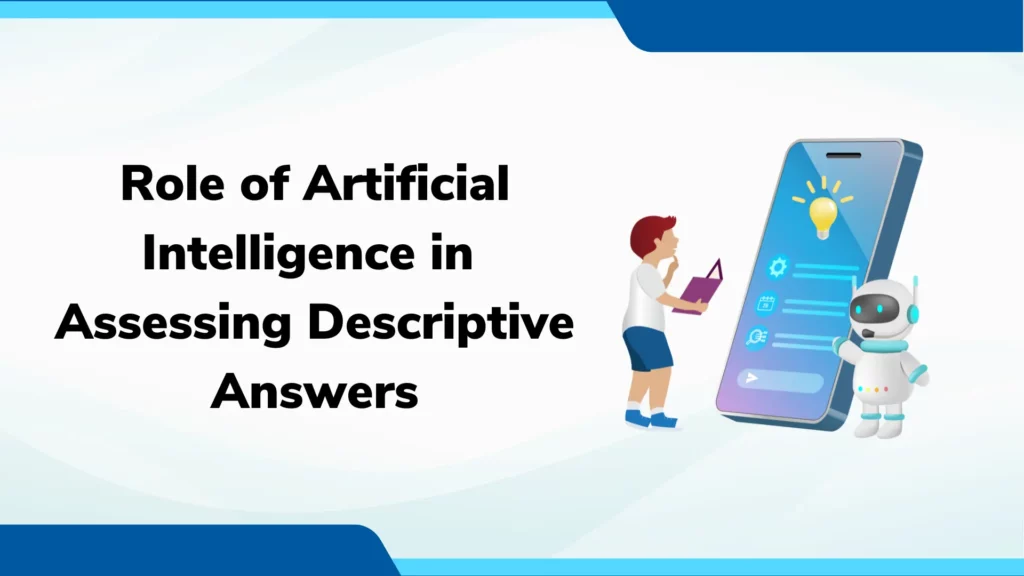
Article Contents
Introduction
In today’s rapidly evolving realm of education technology, evaluating descriptive answers poses a big challenge to the institutes. With an ever-growing number of students and lengthy responses to assess, the traditional method of manual evaluation has proven to be both time-consuming and error-prone which leads to delays in result processing.
Fortunately, the innovation of Artificial Intelligence (AI) offers a promising solution to automate and expedite the manual evaluation process. This article dives into the issue of manual evaluation within the education sector, highlights the potential of AI to assist in this crucial task and explores the remarkable impact it can have on educational institutions.
Let us begin by understanding the problems faced by educational institutions.
🎯The Problem of Manual Evaluation in the Education Sector
Evaluating descriptive answers manually can be a daunting task, particularly when the faculty needs to go through a high volume of responses that need to be carefully read and assessed. Institutes grappling with thousands of students often find it increasingly challenging to ensure accurate and efficient evaluation.
Human evaluators, despite their expertise, are prone to fatigue and oversight, which can hinder their ability to assign appropriate marks based on the quality of each answer. This manual process not only consumes a significant amount of time but also increases the possibility of subjective evaluation and errors.
💡The Limitations of Manual Evaluation
1. Experiencing fatigue, inconsistency, and subjectivity
Human evaluators may experience fatigue and inconsistency as they navigate through numerous responses, potentially impacting the fairness and consistency of grading. Moreover, subjectivity may mistakenly influence their assessment skills which can lead to discrepancies in marking standards.
2. Potential for errors and biases in manual evaluation
The potential for errors and biases in manual evaluation is an important concerning factor. Even the most diligent evaluators may unknowingly overlook certain aspects or misinterpret answers, which can have a significant impact on student’s results. This subjective nature of manual evaluation raises concerns about the reliability and objectivity of the process.
Examples illustrating the drawbacks of manual evaluation in the education sector
- Example 1
Each faculty member needs to read each and every answer meticulously to assign marks appropriately. In the case of thousands of students, this task becomes extremely time-consuming owing to various reasons such as deciphering handwriting and interpreting unclear or ambiguous explanations.
- Example 2
The teacher may need to refer to textbooks, reference materials, or marking schemes to ensure consistency and fairness in their evaluation. They may also need to cross-reference different parts of the answer sheet to award correct marks for interconnected concepts or multi-step problems. Just like above, even this task is extremely tedious when performed for numerous students and can take days to complete which might lead to delay in result generation.
💡How AI Can Assist to overcome these shortcomings?
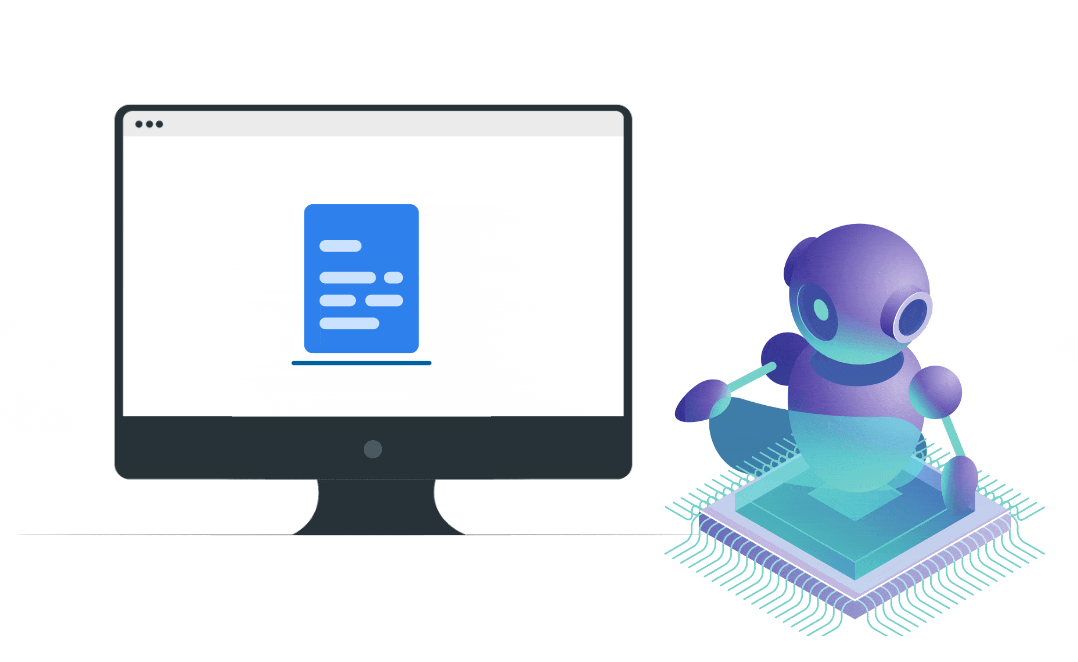
AI presents an innovative and technologically advanced solution to address the challenges of manual evaluation. By utilizing the efficiency of AI algorithms, institutes can streamline the assessment of descriptive answers and transform it into a time-saving process.
AI technology accelerates the evaluation process by swiftly assessing thousands of responses within minutes, expediting result processing and enabling timely student feedback. It enhances accuracy by minimizing human errors and subjectivity through standardized assessment criteria, ensuring fairness and reducing biases.
In a study, AI-based grading of essays scored 81% accuracy compared to human graders who scored 72% accuracy.
Source
AI-powered evaluation systems capture and analyze extensive data, generating valuable insights into student performance and learning gaps. This enables educators to create teaching strategies and support individual student learning journeys.
Embracing AI technology streamlines assessment reduces time and cost, ensures accuracy and fairness, and empowers institutes to deliver efficient evaluations and actionable insights for student success.
💡AI’s Benefits in Descriptive Answer Evaluation
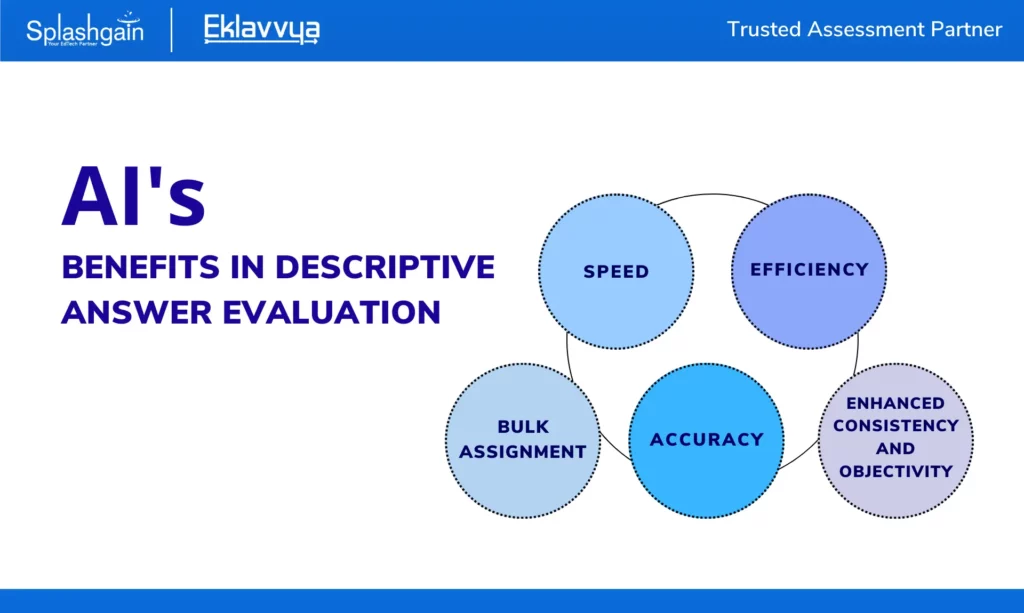
1) Speed
AI algorithms can rapidly evaluate descriptive answers, accelerating the grading process while maintaining accuracy.
2) Efficiency
AI assists teachers in efficiently sorting through numerous descriptive responses, saving valuable time and allowing educators to focus on other productive tasks.
3) Bulk Assessment
AI enables evaluators to assess descriptive answers in bulk, ensuring consistency and reducing the chances of overlooking relevant content.
4) Accuracy
AI algorithms, trained on large datasets, exhibit an accuracy rate of over 90% in evaluating descriptive answers in multiple languages.
5) Enhanced Consistency and Objectivity
AI algorithms provide a standardized approach to evaluation, ensuring consistency in grading across all responses.

📚 Adopting AI for Descriptive Answer Evaluation
To maximize the benefits of AI in descriptive answer evaluation, institutes should provide sample data which includes already evaluated responses and marking schemes, to train the AI algorithm. This ensures that the AI model learns from existing evaluations and model answers, enhancing its accuracy in assessing new responses.
Additionally, institutes should regularly update and fine-tune the AI algorithm based on feedback and evolving educational standards. This iterative process improves the AI model’s performance and helps it to adapt to changing requirements and deliver even more precise and reliable evaluations.
By actively engaging in training and refining the AI system, institutes can utilize their full potential in enhancing the evaluation process and making learning outcomes more effective.
🔬 Exploring AI Options for Essay Evaluation
In a study, AI was found to be 90% accurate in grading essays.
Source
Educational institutions can explore AI-based platforms, such as Eklavvya Auto Descriptive
Evaluation Platform, that offers unique features specifically designed for automating the evaluation of essay-type questions. These platforms utilize AI algorithms to analyze and assess essays efficiently, ensuring accurate and timely evaluations.
🤖AI-Assisted Learning and Personalized Feedback
AI evaluation can contribute to personalized learning experiences
AI evaluation has immense potential to contribute to personalized learning experiences. By analyzing and understanding individual student responses, AI algorithms can identify unique learning patterns, strengths, and areas for improvement. This valuable insight enables educators to provide customized feedback, and personalized learning options for each student.
According to a survey, 44% of teachers believe that AI can provide more personalized learning experiences for students.
Source
With AI-powered evaluation, students can receive customized guidance, support, and resources that cater to their specific needs, fostering a more engaging and effective learning experience. By leveraging AI, institutes can inculcate personalized learning, empowering students to reach their full potential and achieve optimal educational outcomes.
The potential of AI to provide individualized feedback
AI holds immense potential to provide individualized feedback based on students’ strengths, weaknesses, and learning goals. By analyzing vast amounts of data, AI algorithms can identify patterns and trends in student performance and highlight the areas where they excel and areas that require improvement.
This data-driven approach enables AI to generate personalized feedback that is tailored to each student’s specific needs, helping them understand their strengths, address their weaknesses, and move towards their learning goals. AI can offer recommendations, resources, and learning pathways that cater to individual learning styles, pace, and interests.
According to a survey, 68% of students believe that AI can help them improve their academic performance.
Source
This personalized feedback helps students to take ownership of their learning journey, motivates them, and facilitates their overall growth and development. With AI-based platforms, educators can provide valuable guidance, fostering a truly individualized and effective learning experience for each student.
The role of AI in adaptive learning platforms, where evaluations drive tailored educational pathways
AI can leverage evaluation data to dynamically adjust content delivery within learning platforms. Based on the student’s performance and feedback, the AI algorithms can adapt to the difficulty level and sequencing of the content. This ensures that students are consistently challenged at an appropriate level, preventing them from feeling overwhelmed or bored.
As evaluations drive the adaptive pathways, the content can be tailored to match the student’s progress and learning goals which can lead to an optimal learning experience. AI-based evaluation platforms can introduce personalized educational pathways, enabling students to receive education that aligns with their unique learning needs and goals.
The Role of Natural Language Processing (NLP) in AI Evaluation
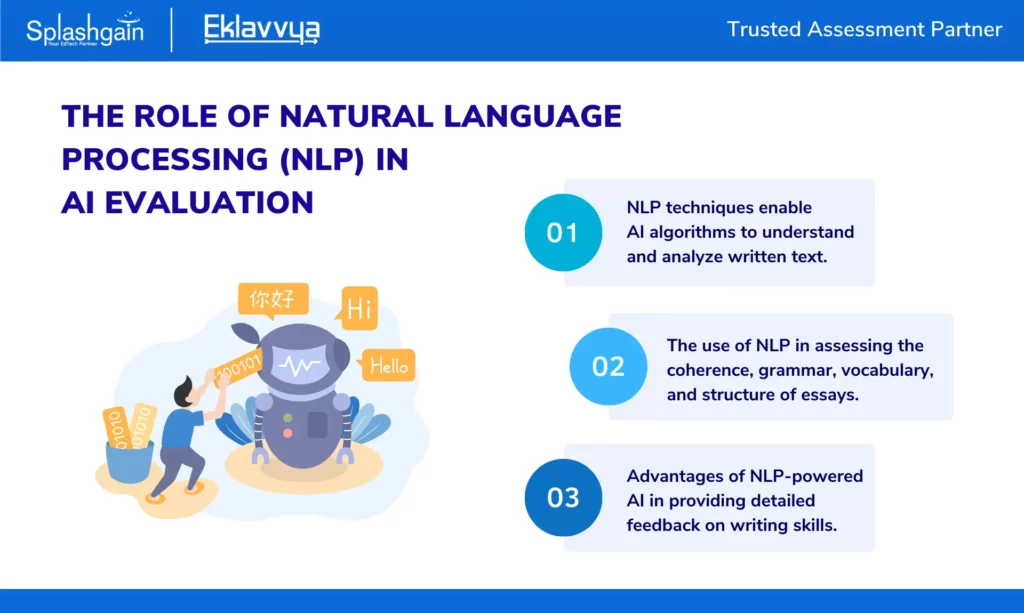
NLP techniques enable AI algorithms to understand and analyze written text
NLP techniques enable AI algorithms to understand and analyze written text by deciphering linguistic patterns, extracting key information, and deriving semantic understanding. This capability empowers AI to extract knowledge, provide valuable insights and generate meaningful responses across various applications, from customer support and content curation to intelligent document analysis.
The use of NLP in assessing the coherence, grammar, vocabulary, and structure of essays.
NLP algorithms can analyze the flow and logical progression of ideas, ensuring the coherence of the essay. Additionally, these techniques can identify grammar errors, such as incorrect verb tense or subject-verb agreement, and suggest appropriate corrections. NLP algorithms can also assess the vocabulary, detect repetitive or inappropriate word choices and provide suggestions.
In a study, AI-assisted grading of essays was found to be 36 times faster than human grading.
Source
Furthermore, NLP can analyze the overall structure of the essay by identifying the introduction, paragraphs, and conclusion, and offer recommendations to enhance them. With NLP, educators and students can receive detailed feedback on various aspects of essay writing, fostering improved writing skills and facilitating effective communication.
Advantages of NLP-powered AI in providing detailed feedback on writing skills
NLP can analyze and assess various languages, along with grammar, coherence, vocabulary, and structure, enabling comprehensive evaluations.
Secondly, AI can offer specific suggestions and corrections, helping learners improve their writing skills by addressing specific areas of improvement.
Lastly, NLP algorithms can provide immediate feedback, allowing students to improve their writing skills.
💡 Case Study for Automated Descriptive Answer Assessment with AI
One of India’s largest training institutes successfully automated descriptive answer assessment using AI. By employing AI, the institute efficiently evaluated over 5000 responses during online exams, saving more than 2000 evaluation hours for teachers. This significant reduction in time and cost shows the effectiveness of AI in enhancing organizational efficiency.
To simplify the descriptive answer evaluation process, educational institutions can explore AI-based platforms like Eklavvya Platform. Eklavvya offers unique features that support the auto evaluation of descriptive answers using AI, automates it and increases the efficiency of the evaluation process.
Future Possibilities and Emerging Trends
Emerging technologies, such as automated essay generation and AI-driven content recommendation systems
Emerging technologies, such as automated essay generation and AI-driven content recommendation systems, offer exciting possibilities in the education system. Automated essay generation leverages AI algorithms to generate coherent and contextually relevant essays, helping students in understanding structure and content.
AI-driven content recommendation systems use advanced algorithms to personalize learning experiences by suggesting relevant educational resources, adapting to individual preferences and promoting self-directed learning.
AI-powered virtual assistants for providing real-time feedback during writing exercises
AI-powered virtual assistants have significant potential in providing real-time feedback during writing exercises. These virtual assistants can analyze and assess students’ writing and offer suggestions for improvement in areas such as grammar, coherence, and style.
With instant feedback and guidance, students can refine their writing skills as they work, fostering continuous improvement and enhancing the overall writing experience.
The evolving role of AI in educational assessments and its impact on the overall learning experience
AI technologies enable efficient and personalized assessment processes, allowing educators to gain deeper insights into students’ progress, strengths, and areas for improvement.
AI can provide immediate feedback to students, allowing them to learn from their mistakes in real-time.
Source
By leveraging AI, educational assessments become more accurate, timely, and customized. This provides the students with a more engaging and effective learning environment that supports their growth and success.

Conclusion
The integration of AI in the evaluation of descriptive answers in education revolutionizes assessment processes. AI algorithms enable a seamless analysis of responses, reducing evaluation time and providing accurate insights into student performance.
Owing to the predefined criteria, AI brings objectivity and consistency to evaluations, ensuring fair assessments. Additionally, AI-powered evaluation systems deliver detailed feedback tailored to individual students’ needs, promoting personalized learning experiences.
By leveraging AI, institutes can save time, enhance objectivity, and provide targeted feedback, ultimately improving the overall learning experience and promoting student success.
Manual evaluation in education has limitations such as being time-consuming, prone to subjective biases, and introducing the possibility of human errors. Additionally, manual evaluation may lack consistency and struggle to handle large volumes of assessments efficiently.
AI can assist in evaluating descriptive answers by utilizing machine learning algorithms trained on large datasets of graded responses. These algorithms can identify patterns, keywords, and indicators of quality in the answers, enabling automated assessment based on predefined criteria. This allows for efficient evaluation, reduces subjectivity, and provides consistent feedback to students, enhancing the overall assessment process.
AI can improve the accuracy and efficiency of education evaluation by automating the assessment process, reducing human errors and biases. With AI algorithms, evaluations can be conducted swiftly and consistently, enabling timely feedback and personalized insights for students.


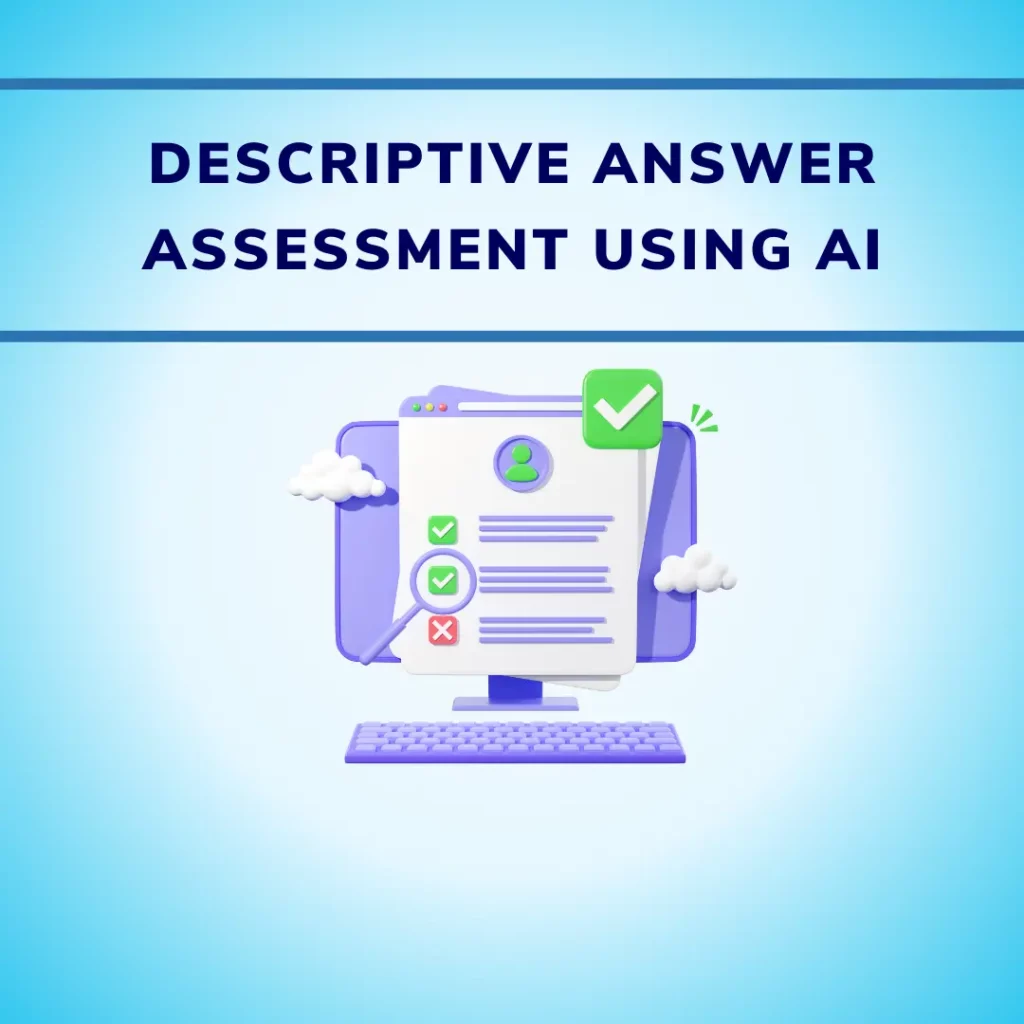

![How Government-Led Exams at 250+ Locations Are Setting New Standards of Integrity [Case Study]](https://www.eklavvya.com/blog/wp-content/uploads/2024/04/Enhancing-Exam-Integrity-Government-Certification-in-250-Locations-150x150.webp)
![Transforming Central Govt. Exams Evaluation: How Onscreen Marking is Leading the Charge [Case Study]](https://www.eklavvya.com/blog/wp-content/uploads/2024/04/How-Onscreen-Marking-Revolutionized-Central-Govt-Exams-Case-Study-1-150x150.webp)
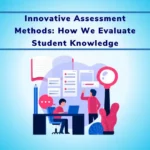
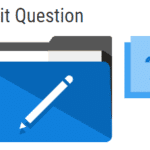

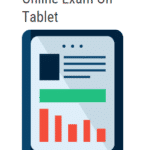









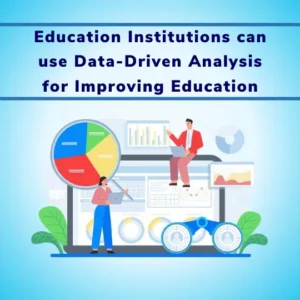

![How Onscreen Marking Revolutionized Central Govt Exams [Case Study]](https://www.eklavvya.com/blog/wp-content/uploads/2024/04/How-Onscreen-Marking-Revolutionized-Central-Govt-Exams-Case-Study-1-300x300.webp)
